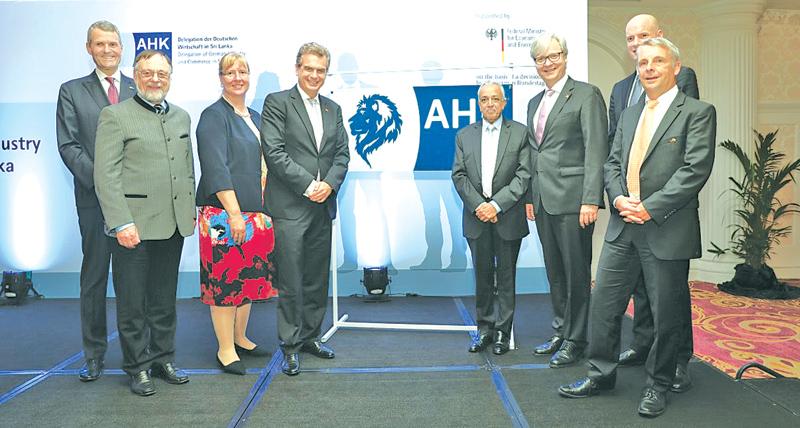
The official opening of the Delegation of German Industry and Commerce in Sri Lanka was held last week in Colombo. With the opening of the office in Sri Lanka, the worldwide network of German Chamber of Commerce abroad covers 140 offices in 92 countries.
“This is my first visit to Sri Lanka. What I will tell my friends in German will be the positive attitude the Sri Lankans have towards the visitors. The lasting impression of this country is wonderful. Sri Lanka is absolutely a pleasure to be in. I am pleased to have visited this beautiful country,” Association of German Chambers of Commerce and industry (DIHK) CEO Dr. Martin Wansleben said.
“Sri Lanka has many positives. We need to highlight these to the world. What ever the world opinion on Sri Lanka one has to come to the country to experience the true sense of hospitality. I am glad with the arrangements the government of Sri Lanka had made for us. It is important that we develop further economic relationship and trade activities. “The German economy is internationally intertwined. Bilateral cooperation is of utmost importance especially considering the many challenges facing companies worldwide. Alone, hardly anything is possible in today’s world.
“There is huge growth potential for German companies in Asia. And the dynamic market of Sri Lanka will open up even more opportunities. With the opening of our office in Colombo our network of German Chambers of Commerce abroad is growing to 140 locations in 92 countries. By doing so, we are starting as in-dept and mutually beneficial cooperation both for the German and the Sri Lankan economy,” he said.
With a yearly growth rate of about five percent and as a maritime hub between Asia, Africa and Europe, Sri Lanka offers business opportunities for both sides.
While Sri Lankan exports to Germany grew by 13 percent in 2017, German exports grew by 81 percent to over 570 million Euro in 2017, reaching a total bilateral trade volume of more than 1.25 billion Euro. Sri Lanka raises more and more interests for German sourcing in the sectors of food and textiles.
German investments in the apparel and cement industries, industrial gas production, precision technology and lately in the insurance sector and underlining the country’s diversified opportunities.
German foreign direct investment in Sri Lanka amounts to approximately 170 million Euro listing Sri Lanka in a global approach among countries number 86 and ranking 3rd as target location in South Asia after India and Pakistan.
Minister of Development Strategies and International Trade, Malik Samarawickrama said, “Germany has been a country that focussed strongly on economic reforms – and doing those in a timely and focussed manner. Germany was more resilient than other Euro area economies, and bounced back quicker, because you undertook tricky but important reforms to the business climate, to labour laws, much earlier on.
“This set the foundations for a strong economy. Even now, we see how Germany’s economic growth has been an anchor for the economic recovery of the whole European region.
“No doubt, Sri Lanka too has to focus on economic reforms. We are making steady progress on this front, and I am sure German companies will begin to see the results of this.
“Our Government has taken numerous initiatives to stabilise and re-orient the economy, from a growth model that was heavily dependent on debt-fuelled public spending, to one driven more by the private sector, trade, and FDI,”
“We have taken many measures to build strength and resilience in our economy. We are very focussed on fiscal consolidation, and the results are already visible – with the budget deficit improving and the international ratings agencies providing favourable outlooks.
“Our Parliament has passed a new Inland Revenue Act, which comes into effect in a couple of weeks, and it provides a progressive, modern, and transparent income tax policy.
“The tax incentives regime is now firmly written into the law, and is based on generous investment allowances. The top rate of income tax is now lower than many countries in the region.
“On monetary policy, the Central Bank has moved towards a market-determined exchange rate regime and is proactively keeping inflation in check. We just passed a new Active Liability Management Act, to ensure national debt is cleverly and credibly managed. And last year we passed a new Foreign Exchange Act, that brings very contemporary and business-friendly approach to managing foreign exchange.
“Across the government, we are focussing on reform initiatives to catalyse growth and create better jobs for our people. We are committed to improving the ease of doing business.
“By mid this year, the time taken to registering a new business will reduce from six days to just one day. Finding land and registering property will be halved from 51 days to 26 days, and the procedures reduced from 9 steps to two steps.
“We are also introducing an ‘Electronic Single Window’ that will link together dozens of State agencies dealing in international trade.
Through the Colombo International Financial City and Port City projects, we are creating a unique business climate that is globally competitive and will provide an attractive operating environment like no other in the South Asian region.
This new city will function like a special economic zone and have international laws and easier regulatory and legal systems,” he said.
